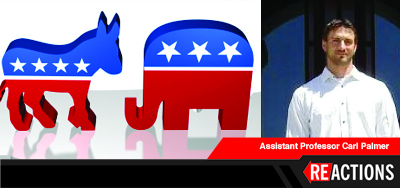With the anticipated decision this week of Hillary Rodham Clinton on a presidential bid in 2016, Assistant Professor of Politics Carl Palmer weighs in on how this political season might shape up. Palmer, whose research focuses on national elections, predicts some surprising – yet familiar – names and a lot of finger pointing. Let the election games begin.
Palmer:
Next week should be pretty nail biting as we wait for Hillary Clinton to announce whether she is putting her hat in the ring. All other potential Democratic contenders for the White House are waiting to see what she will do before they announce.
It’s all going to happen soon because we are reaching a point-of-no return for any candidate to build the minimum infrastructure to run a campaign. I would be shocked if Hillary Clinton did not run. All other potential candidates are not as well known, such as Barry Sanders and Elizabeth Warren.
Warren actually seems hesitant to run, even though many in the Democratic Party want her. As a junior member of the Senate, I think she watched the struggles President Obama had – approaching the political scene with a sense of naivety, butting heads with the establishment. She appears to want to wait until she has more experience and gravitas.
On the Republican side, it is a little bit surprising. Former Gov. Jeb Bush’s actions show he is considering a run. Personally, I thought he would have jumped into the scene much earlier, perhaps even soon after his brother left office. But he seems to be considering a run.
Mitt Romney is also reaching out in Iowa and forming teams. He had originally declared himself out of the race. But perhaps with Paul Ryan officially saying he will not run, Romney felt it was time to jump back in.
There will be other names floated around, like Sen. Ted Cruz, but even the smaller candidates are watching and waiting to see what happens with the Democrats.
Issues likely to be key in this election will be immigration and the Keystone Pipeline. The Republicans have a supermajority – enough to pass a lot of bills, but not enough to override a veto from the President. We hear a lot about how the last Congress was one of the least productive in history, and we may be looking at a repeat of that stalemate. Which will mean a lot of finger pointing and blame.
You can see a lot of what is to come in the transition to Sen. Mitch McConnell from Sen. Harry Reid for the Senate majority. There is a lot of rhetoric that comes down to jockeying for power or trying to save face.
One thing is clear, the Republicans want the White House back, and this could be a rough battle.
Carl Palmer can be reached at MediaRelations@IllinoisState.edu.

